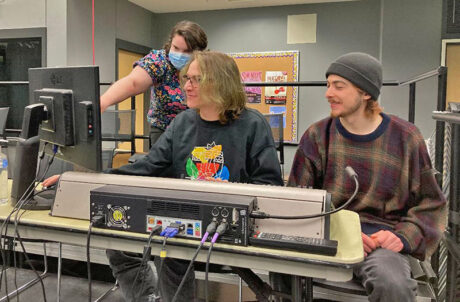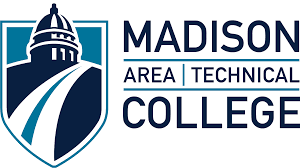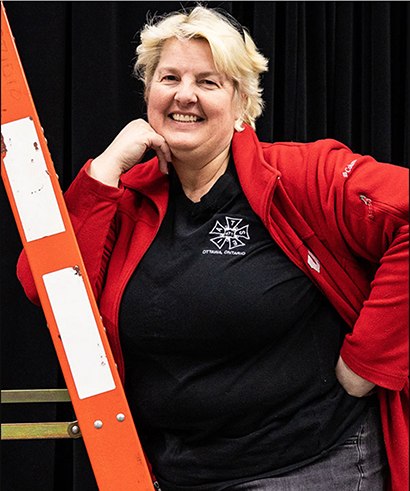
The “magic of theater” does not happen without legions of people behind the scenes. It’s no secret that the live performance industry took a giant hit due to the Covid pandemic when venues were shuttered. The work vanished overnight. Fast forward to now. Venues are open, shows are touring, major events are again happening in front of sold-out crowds. But many of those behind-the-scenes workers are now gone. More than a quarter of performing arts workers report that they will likely leave the profession. Venue operators, touring shows, conference centers and cruise ships are scrambling to fill key personnel and crew spots.
Kristi Ross-Clausen, director of the new Stage and Entertainment Technology (SET) certificate program at Madison College, in Madison, Wisconsin, knows this all too well. “I am getting calls from my contacts in the industry every week looking for people with the right skills and certifications. Once these students graduate, they should have no problem finding good jobs.” Her own background is having worked in all things backstage for theater, concerts, and live events. She is an IATSE stagehand that’s worked on everything from Broadway tours to little kids’ dance reviews, an Equity Stage Manager, and she has taught K-college for a long time. Along with teaching the courses for the Stage and Entertainment Certificate at Madison College and serving as technical director for the school’s productions, she still works part-time as a stagehand and consults on theater safety.
Ross-Clausen rebuilt Madison College’s Stagecraft curriculum to focus on stagehand work and the technical aspects of stagecraft. This shift sets the program apart from many college programs which focus on performing and design. Madison College’s SET certificate program launched in the fall of 2022. It’s designed to give students the skills necessary for a wide range of career paths in live entertainment; from lighting and audio to wardrobe, stage management, props and even wigs. After being exposed to various aspects of stagehand work, students can dive deeper with practicums in specific areas. Carson Heussner, a student in the SET program, said that the curriculum is helping him build a skillset with “a wide base and a tall mountain.” He is building a very deep knowledge and proficiency in all aspects of stage lighting while also getting trained in a wide variety of areas that will make him invaluable backstage. He also notes, “We have the opportunity to do a lot of networking with professionals in the industry, which is great for making connections for our eventual careers.”

Set Up for Success
Career readiness is at the core of how Ross-Clausen built the curriculum. “I’m not willing to set my students up for failure. When they graduate, they will have completed critical coursework to prepare them, but as important, they will have relevant industry training and certifications to make them career-ready,” she states. The students also take advantage of online training through various trade organizations and unions such as AVIXA, as well as IATSE. Ross-Clausen has also long been a passionate advocate for safety in the event and production area. She teaches safety as part of the curriculum and the students will also be completing an Occupational Safety and Health Administration (OSHA) course created specifically for stage and entertainment work.
Exposing students to the wealth of career opportunities served by their newfound knowledge is a key component of the program. “The SET certificate may be aimed at stagehands, but that’s not the only career that it serves,” explained Ross-Clausen. “These students could have careers in convention centers and hotels, houses of worship, cruise ships, as well as television and movie productions. But there are also manufacturing and technology companies that focus on the entertainment industry, several right here in Wisconsin, and they all need people who understand the environment.”

Kristi Ross-Clausen recently answered a few questions to give a bit more insight into the new program:
Tell us about the Certificate program in Stage and Entertainment Technology.
The Stage and Entertainment Technology Certificate at Madison College requires 15 credits and can be completed in one school year as a part-time course of study. It can also be embedded into two-year, full time Associates Degrees in Liberal Arts or Education with guaranteed transfer to the University of Wisconsin-Madison and many other Bachelors granting schools. It’s possible to do the Associates part time, but it would take longer than two years, of course. An advantage of the Associates Degree is it’s eligible for financial aid. There’s also a generous scholarship available for the SET Certificate and most students work while taking the classes.
The certificate prepares people for entry-level jobs as a stagehand working in all the places stagehands work: theater, concerts, live events, expos, immersive experiences, sporting events, and so on. And these skills are also great for someone interested in film and TV, or working at an amusement park, house of worship, and any other places groups of people come together to be entertained.
When live events started happening again after the Covid shutdown, over 30% of the workforce didn’t return. Employers contacted Madison College looking for workers and we started the Stage and Entertainment Certificate to meet that need. I was asked to help design and lead it because I’ve worked in many facets of the entertainment industry including as a stagehand in all of the Yellow Card departments and sub-departments, plus I know the AVL integration, and live events business, too. Most people don’t think of Wisconsin when they think of entertainment but we’re home to some of the largest manufacturers, suppliers, and events companies including Full Compass, Electronic Theater Controls, MODtruss, Blizzard Lighting, Clearwing, Lighthouse, and many others. There are a half-dozen theaters which host touring Broadway show, several large arenas with concerts and sporting events, and many more entertainment venues. There are tremendous opportunities, but you need the skills to get the jobs. Completing the certificate gives you the skills and the connections for a great career.
What’s covered in the classes?
They provide a broad foundation so our students are competent in many areas, with expertise in one or two. Most college programs are focused on teaching design; we’re focused on the skills to make those designs happen. We start with safety, terminology, and communication skills, then branch into the craft specific skills by department including carpentry, lighting, audio, video, properties, wardrobe, rigging, and management. We also work with our industry partners who offer practicum opportunities including many that are paid. The practicums are designed to meet each student’s personal interests. They might be learning how to run QLab for an Equity theater company, working part-time for a manufacturer or AVL integrator, running lighting for another school’s musical, or any of the backstage roles for our own college productions. Our students are already working part-time doing concerts, theater, and other events professionally while still in school. We also attend conferences such as KCACTF, USITT, InfoComm [AVIXA], and LDI to see the newest equipment and techniques.
Why should someone go to school for this, can’t they just learn it all on the job?
Twenty years ago, maybe, but it’s simply not possible any more. Now we know the best option is a mix of classroom and on the job, and that’s how the certificate is designed. The equipment is far more sophisticated now, systems are more complex, and we know things get missed when it’s just someone telling you on the job. You’ve probably played the “telephone game” where one person says something to the next person and the next and so on, so by the time you get 5 or 6 people away, the message is completely wrong. Good training isn’t just word of mouth and things are changing rapidly. Audio and lighting systems now are all networked, automated scenery is common, and even ‘simple’ shows probably include I-Mag and maybe streaming. Employers want to hire someone with at least a basic knowledge of needed skills. Even when we dearly need people to fill a call, we must ensure they don’t pose a safety hazard, can find their way around the venue, and are able to use simple tools. I’ve been doing this for decades and I still learn new things on the job site, but I also continue to take classes, go to conferences and complete manufacturer’s training.
What’s the best part of the program to you?
Seeing our students do well. When an employer thanks me for sending them someone who is confident, qualified, and competent, then asks when the next cohort will be completing their studies, I know we’re doing the right thing for everyone. We want to add more women and people of color, too, so if you know someone interested, tell them to apply. We’ve already had many people enroll for the fall, so don’t wait, we have a limit on how many we can take.
Learn more about the Madison College’s SET program at: https://madisoncollege.edu/academics/programs/stage-entertainment-technology-certificate


